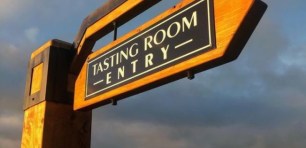
d'Arenberg father and son team d'Arry and Chester Osborn. Source: Courtesy of d'Arenberg.
As a family-run winery founded almost a century ago, d’Arenberg has arguably seen it all.
But, as a challenging year comes to an end, it could still be facing its biggest challenge of 2020, as China imposes tariffs of more than 200% on Aussie wine imports.
Last year, China accounted for some $1.2 billion in wine exports, and it has been suggested a shortfall could hit smaller exporters the hardest.
Chester Osborn, chief winemaker and viticulturalist at d’Arenberg in McLaren Vale, South Australia, explains this family-run business has seen its fair share of ups and downs.
A fourth-generation winemaker at the business, he’s been working in wine for some 38 years, and has seen “so many challenges”, he explains.
In the background of our call, his father, highly esteemed former chief winemaker d’Arry Osborn, suddenly pipes up.
“You ought to try 80 years,” he says.

Chester and d’Arry Osborn hard at work. Source: Courtesy of d’Arenberg.
For his part, d’Arry Osborn isn’t too concerned about the COVID-19 challenge the business has faced this year.
He’s more focused on keeping an eye on the weather — hoping for rain and thinking ahead to next year’s crop.
But, he’s most concerned about the Chinese tariff situation.
This is “very worrying for the industry”, he says.
Sales to China account for about 10% of d’Arenberg’s sales volume, but about 20% of turnover, Chester Osborn explains.
“It’s significant,” Chester Osborn notes.
“It’s quite a profitable market — we sell a lot of high-end wine there.”
And, while there’s no harm in looking to sell into other markets, that’s something the business is already doing, and it’s not likely to fill the gap.
d’Arenberg sells into about 90 countries, and “we haven’t put the brakes on any of those”.
He theorises that a lot of Aussie exporters are in the same boat. Simply switching to service new markets is easier said than done.
“We’ve been trying to sell wine elsewhere for ages,” he adds.
“It’s a bit hard to suddenly turn on the taps to another country when it wasn’t there to begin with.”
It’s a little different for the barley industry, which is also facing tariffs. Barley is a commodity, and there’s always going to be demand for it somewhere. Wine, on the other hand, is a luxury.
“Obviously people aren’t going to buy wine with a 200% tariff on it,” Osborn says.
Osborn would like to see the Australian government “start to change their rhetoric” on this.
“Australia is being very forthright in the way they think China should act,” he explains.
“I don’t think we need to be quite so forthright in commenting on everything that China does.
“I don’t think that bodes well for our relationship.”

d’Arenberg’s iconic cube cellar door. Source: Courtesy of d’Arenberg.
“A doozy”
Even so, the trade stoush with China is just “the latest hiccup” in a challenging year, Osborn says.
Luckily, d’Arenberg wasn’t badly affected by last summer’s devastating bushfire season.
But the heatwave and dry conditions of late-2019 and early-2020 did mean the vineyard saw a very low-yield crop — the lowest Osborn has seen in almost four decades of winemaking.
The business was also feeling the early effects of the COVID-19 crisis in January and February, with notably reduced numbers of Chinese tourists.
However, winemaking is a perpetually challenging business, and d’Arenberg has survived worse.
The business started life in 1912 as a grape grower, and the winery was built in 1927 — just in time for the Great Depression.
“That was a horrible time for the wine industry — demand was very low for grapes,” Osborn explains.
It’s survived through World War Two (and, as a grower, World War One).
In the 1980s, the government implemented its vine pull scheme, paying people to tear up their vineyards, in a bid to address over-supply.
“There were quite a lot of years where grapes were very cheap, and it was very difficult to make a living.”
Around the same time, d’Arenberg’s distributor was bought out by a larger company, causing the business to find a new one.
“That was an interesting, trying time.”
Then, of course, the global financial crisis of 2008 saw sales slip, and made money tricky to come by.
All in all, 2020 was “certainly a doozy”, Osborn admits.

d’Arenberg chief winemaker Chester Osborn. Source: Courtesy of d’Arenberg.
But sales haven’t been too terrible, government assistance has meant he’s been able to keep all staff on the books, and — touch wood — the spring rains so far bode well for a bumper crop in 2021.
“We’re not as stressed as we could have been,” he says.
“After 38 years of doing it, you’ve seen so many challenges here and there all the time.
“You can only focus on the positives.”
Handpicked for you

Explained: Why is China imposing tariffs on Australian wine and barley?



COMMENTS
SmartCompany is committed to hosting lively discussions. Help us keep the conversation useful, interesting and welcoming. We aim to publish comments quickly in the interest of promoting robust conversation, but we’re a small team and we deploy filters to protect against legal risk. Occasionally your comment may be held up while it is being reviewed, but we’re working as fast as we can to keep the conversation rolling.
The SmartCompany comment section is members-only content. Please subscribe to leave a comment.
The SmartCompany comment section is members-only content. Please login to leave a comment.